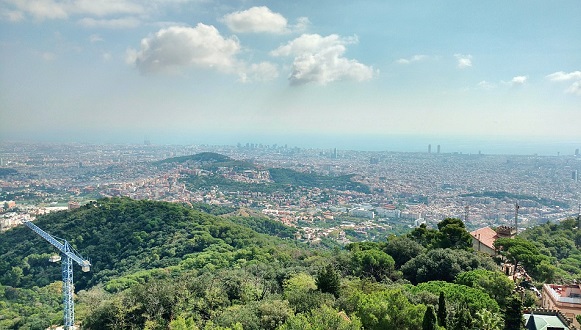Barcelona has been appointed by the European Forest Institute to organise its annual forest and city conference in 2022
The European Forest Institute (EFI) has appointed Barcelona to organise its annual forest and city conference in 2022, an international recognition. This Catalan candidature is led by the AMB, CREAF, the Institute of Advanced Architecture of Catalonia (IAAC) and the Centre of Forest Science and Technology of Catalonia (CTFC).

The decision was taken at mid October 2020, at the assembly of the EFI during the annual meeting in Bonn, which has more than 130 member organisations in 40 countries. Barcelona was competing with Madrid, Soria, and Navi Sad (Serbia) and has been selected for presenting a candidacy that emphasizes programs on the promotion of biodiversity in the Metropolitan Area. The strengths are citizen participation, the fight against climate change, the renaturation of its public space, and the use of nature-based solutions. More specifically, innovative wood construction projects have also been highlighted.
Throughout 2022, activities will be held to discuss the impact of the circular bioeconomy on urban environments. A point of discussion that overcomes the traditional dichotomy between urbanised spaces and natural spaces and thus makes it possible to define what biocities should be like. Since 2014, the European Forest Cities have been Bilbao, St Petersburg, Vienna, Oslo, Aberdeen, Bonn and in 2021 it will be Prague.

We are very happy to join this initiative, which places Barcelona's forests at the centre of the debate of forestry experts. And it does so at a time when urban forests are taking on special importance as biodiversity reserves and as providers of services to the population.
JOAN PINO, Director of CREAF and Professor of Ecology at the UAB.
A multi-disciplinary candidacy
The European City of the Forest project in Barcelona is much more! It also includes a programme on forests and biocities in the educational centres of the Barcelona metropolitan area, an event where projects related to the reforestation of the planet, intelligent forestry and the promotion of biodiversity are presented, a Film and Ecology Festival, an international competition of designers for the development of products related to the biocities, the presentation and visit of emblematic buildings built with wood and a specific seminar during the Smart City Congress.
The Metropolitan Area of Barcelona has almost 40% of its 636 km2 as protected areas, including the Parc de Collserola, La Serralda Litoral and the Parc del Garraf.
The main conference will be held during October 2022 in various locations in the Metropolitan Area, including the Hospital de San Pau (where the EFI sub-headquarters are placed) and the IAAC's Valldaura Labs in the Parc de Collserola.
The proposal also has the support of many organisations such as the Consortium of the Serra de Collserola Natural Park, Barcelona Global, the Barcelona Urban Ecology Agency, the Col·legi d'Arquitectes de Catalunya, the Col·legi d'Enginyers Forestals de Catalunya, the Col·legi d'Enginyers de Camins, Canals i Ports de Catalunya, the Consejo Superior de los Arquitectos de España, the Instituto Tecnológico de la Construcción de Cataluña, the Ajuntament de Cerdanyola, the Universitat Politècnica de Catalunya, the Fira de Barcelona, the Fundació Catalunya la Pedrera, the Hospital de San Pau, the Cercle d'Infraestrctures and the Estudi Ramon Folch.







